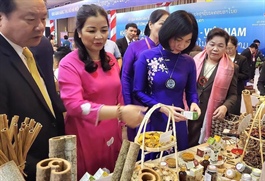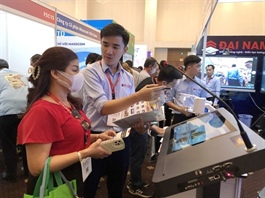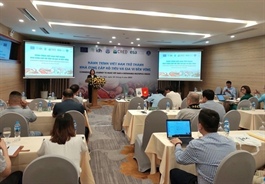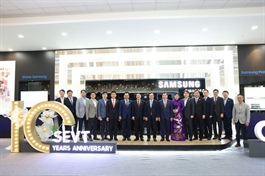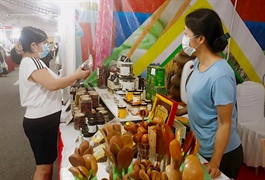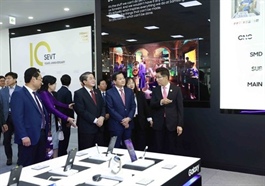Carbon credits take root in agriculture sector
Carbon credits take root in agriculture sector
Carbon credits are gaining traction in the agriculture sector as an instrument to promote sustainable farming practices and improve farmer income.
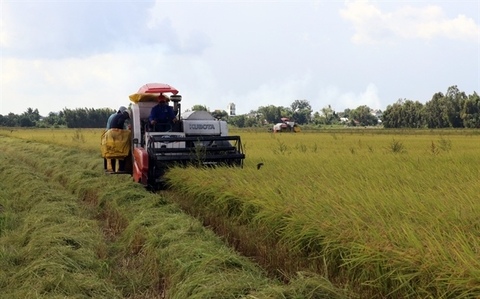
A tractor harvests crop in VNSAT rice paddies in Kien Giang Province. — VNA/VNS Photo Le Huy Hai |
Cao Thang Binh, senior agricultural specialist at The World Bank, revealed that the VNSAT Project had contributed significantly to Viet Nam's transition to sustainable agriculture.
After seven years of implementation, the project has increased farmer income by 30 per cent through the efficient use of water and pesticides.
More importantly, it has removed 1.5 million tonnes of CO2 from the atmosphere, which, he believed, could be sold as carbon credits to further improve farmer livelihoods.
"The time is ripe for the sale of the carbon credits generated by VNSAT rice paddies," said Binh.
The specialist said that his organisation was working to establish a mechanism under which carbon credits could be traded by 2024. In his estimation, the 1.5 million tonnes of CO2 would yield US$20 million annually for farmers.
Regarding the project of "one million hectares of low-emission high-quality rice paddies" in the Mekong Delta, he said The World Bank would raise $40 million between 2023-2024 and $60 million between 2025-2026 to pay for its carbon credits.
"After this $100 million, we will proceed with an additional $400 million to cover all the carbon credits generated by the project," added Binh.
Le Thanh Tung, deputy head of the Department of Cultivation, Ministry of Agriculture and Rural Development, said the prime objective of the project is to establish high-quality rice farms that are climate-resilient and low in greenhouse gas emission.
To that end, the project has set the target of using 30 per cent less chemical fertilisers and water for the farms by 2025, and 40 per cent in the following five years.
He also said the agriculture sector is on the right track as green consumption had begun to take root globally.
Minister Le Minh Hoan underlined three challenges facing the agriculture sector: climate change, volatile markets, and the global change in consumer behaviour.
The last challenge, he believed, is the most serious because consumers have shown a growing demand for environmentally friendly and socially responsible products, exposing the need for an across-the-board shift to greener production.
The minister asserted that sooner or later eco-labels would become mandatory for products in shopping malls and commercial centres. He urged producers to act quickly to stay ahead of the curve in the country's green transition.
"Producers who are quick to embrace sustainability will be the first to reap its rewards," said Hoan.
Carbon credits can be traced back to the UN's Kyoto Protocol on Climate Change, which was passed in 1997. There are broadly two types of carbon markets: voluntary and mandatory.
The mandatory market is the market in which the sale of carbon credits is regulated by the Framework of the United Nations Convention on Climate Change. The voluntary market, on the other hand, operates outside the previous one but in parallel, allowing firms to trade carbon credits on a voluntary basis.
Under the protocol, market participants are allocated a certain amount of CO2 emissions, which they are allowed to emit over a specific period. If they emit an amount less than the allotted amount, they can sell the unused emissions to those who have exceeded their quota.
That means the one million hectares of low-emission high-quality rice paddies in the Mekong Delta have reservoirs of carbon credits that can be sold to improve farmer income.







